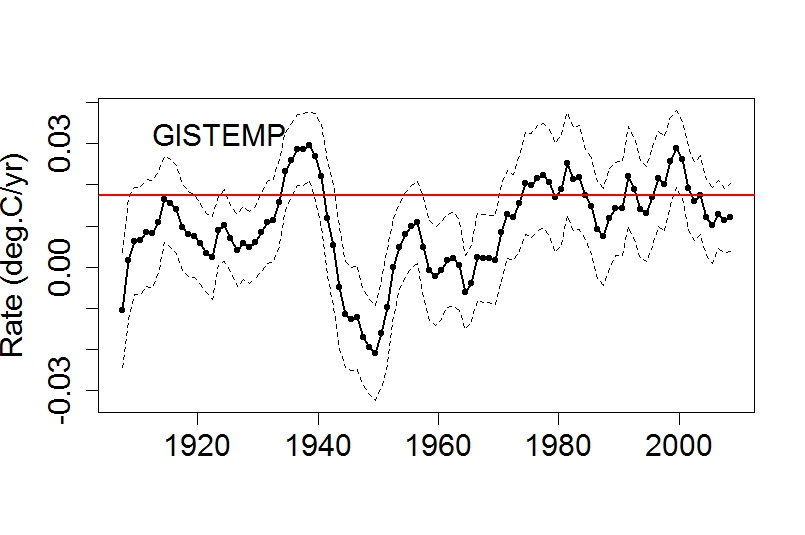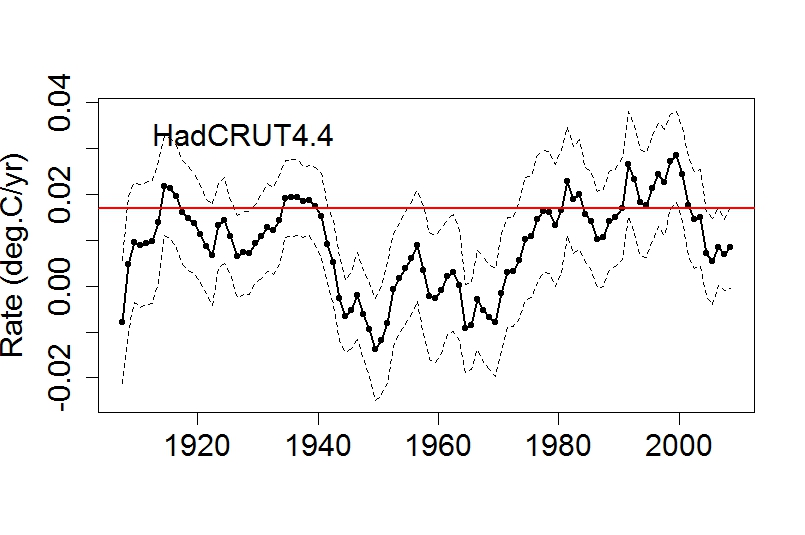Environment & Energy
Related: About this forumScientific American: Did Global Warming Slow Down in the 2000s, or Not?
Scientific American By Gayathri Vaidyanathan,
ClimateWire on February 25, 2016
The global warming “hiatus,” a controversy that spawned congressional hearings and thousands of skeptical blog posts before being curbed last year, is back.
The “hiatus” refers to the observation that global warming has slowed in the past 15 years. The planet is still warming, but just not as quickly as some climate scientists expected it to.

This graph shows a “slowdown” in rising temperatures until 2010. The black line shows temperatures as predicted by climate models, and the red line shows actual temperatures. Warming has recently increased, breaking historical records in 2014 and 2015.
Nature Climate Change, February 24, 2016 doi:10.1038/nclimate2938
The debate between researchers and doubters reached a crescendo last summer, when scientists at the National Oceanic and Atmospheric Administration updated their temperature records and concluded that global warming has not slowed down in the 2000s (ClimateWire, June 5, 2015).
Now, a group of prominent climate scientists are challenging NOAA’s conclusion in a commentary published this week in Nature Climate Change...snip
...“As scientists, we must go where the evidence takes us, we can’t allow our worries about climate contrarians and how they might seek to misrepresent our work to dictate what we do and do not publish,” he said...snip
MORE: http://www.scientificamerican.com/article/did-global-warming-slow-down-in-the-2000s-or-not/
Making sense of the early-2000s warming slowdown
Nature.com
http://www.nature.com/nclimate/journal/v6/n3/full/nclimate2938.html
Global Warming "Hiatus" Debate Flares Up Again
Researchers now argue that the warming slowdown was real
By Jeff Tollefson,
Nature magazine on February 24, 2016
The latest salvo in an ongoing row over global-warming trends claims that warming has indeed slowed down this century.
An apparent slowing in the rise of global temperatures at the beginning of the twenty-first century, which is not explained by climate models, was referred to as a “hiatus” or a “pause” when first observed several years ago. Climate-change sceptics have used this as evidence that global warming has stopped. But in June last year, a study in Science claimed that the hiatus was just an artefact which vanishes when biases in temperature data are corrected...
http://www.scientificamerican.com/article/global-warming-hiatus-debate-flares-up-again/
bananas
(27,509 posts)Nature Climate Change | Commentary
Making sense of the early-2000s warming slowdown
John C. Fyfe,
Gerald A. Meehl,
Matthew H. England,
Michael E. Mann,
Benjamin D. Santer,
Gregory M. Flato,
Ed Hawkins,
Nathan P. Gillett,
Shang-Ping Xie,
Yu Kosaka
& Neil C. Swart
Nature Climate Change 6, 224–228 (2016)
doi:10.1038/nclimate2938
Published online 24 February 2016
It has been claimed that the early-2000s global warming slowdown or hiatus, characterized by a reduced rate of global surface warming, has been overstated, lacks sound scientific basis, or is unsupported by observations. The evidence presented here contradicts these claims.
muriel_volestrangler
(101,307 posts)...
Here are the 15-year overlapping trends, but without the clutter of other results, and with a 95% confidence interval for the 15-year trends added as dashed lines:

The horizontal red line marks the average trend since 1970, about the time that the trend changed to its modern value according to change-point analysis.
Two things should be noted. First, since about 1975 all of the confidence intervals for 15-year trends include the since-1970 trend value, except for a single one for which the confidence interval is higher — not lower — than the since-1970 trend. That’s extremely powerful evidence against the presence of a “slowdown.” Second, that single extra-fast “speedup” excursion isn’t real evidence of a speedup, because so many intervals are tested; there are so many chances to exceed the 95% confidence limits for a single interval, that such an excursion is no surprise, in fact it’s to be expected.
...

https://tamino.wordpress.com/2016/02/25/no-slowdown/